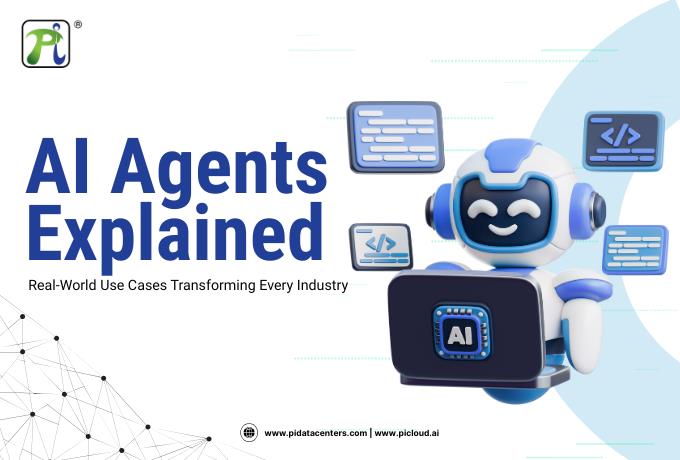
AI Agents Explained: Real-World Use Cases Transforming Every Industry
AI chatbots use generative AI to respond to a conversation based on just one interaction. The chatbot uses natural language processing to answer a question that someone asks.
AI agents represent the next significant advancement in AI technology. They can solve complicated, multi-step problems on their own by using advanced reasoning and iterative planning. And they will improve operations and productivity in all fields.
For example, an AI customer service agent can go beyond simple query responses. It can review a user's outstanding balance, suggest suitable payment options, and even complete the transaction once the user confirms, offering a seamless, end-to-end experience.
AI agent systems take in huge amounts of data from many different sources, including third-party apps, to figure out problems, come up with plans, and carry out tasks on their own. Companies are using AI agents to make customer service more personal and speed up software development.
What are AI Agents?
An AI Agent is a smart system that learns from its environment, makes decisions, and acts independently.
AI Agents work more like a human assistant than traditional AI models, which need human prompts. It plans, prioritizes, executes, and optimizes. It uses multi-agent frameworks, which let different AI agents work together to do complicated business tasks without needing human help all the time. Some agents gather data, some plan, and some carry out the plans.
For instance, in an enterprise setup, an AI agent s system could:
- Collect market data
- Analyze competitor pricing
- Recommend pricing strategies and
- Automatically update pricing models in real time, all independently.
How Do AI Agents Work?
AI agents are made up of different layers of intelligence at their core:
- Understanding Goals: The system figures out what users mean when they say things like "optimize cloud infrastructure for cost and performance."
- Contextual Reasoning: It uses generative models, knowledge graphs, and real-time data to figure out what the context is.
- Planning: The AI makes a plan with steps like setting up virtual machines, moving resources around, or changing SLAs.
- Autonomous Execution: AI agents carry out tasks using APIs, automation frameworks, or integrated enterprise systems.
- Continuous Learning: It keeps an eye on results, gets feedback, and changes to make better decisions in the future, becoming more efficient over time.
Example: For instance, think of an e-commerce business that uses AI agents to manage its cloud resources. The AI predicts spikes in traffic, allocates resources ahead of time, optimizes workloads, and shuts down servers when they aren't being used. This saves money and makes sure that servers are always up and running.
Why Do Organizations Need AI Agents?
Businesses today have to deal with more and more complicated things, like managing hybrid cloud environments and giving customers real-time experiences. AI agents bridge the gap between decision-making and automating tasks.

Key benefits include:
- Autonomous Decision-Making: Reduces dependency on human monitoring and improves turnaround time.
- Operational Efficiency: Optimizes workflows, resources, and budgets without manual intervention.
- Scalability: Manages large-scale operations across distributed systems like cloud or logistics networks.
- Innovation Acceleration: Frees teams from repetitive tasks, allowing focus on strategy and innovation.
AI Agents in Action: Industry-Specific Use Cases
- Customer Service: AI agents can change how people talk to customers by fixing problems on their own. For instance, AI agents can tell when a customer is upset, look up CRM data, give refunds, and follow up, all without needing any help from a person. This makes sure that responses are faster and more tailored to each customer.
- Retail and Hospitality: AI agents can predict demand, improve inventory management, and automate reordering in business operations. For example, a retail chain uses AI agents to keep an eye on POS data from all of its stores and automatically restock items before they run out.
- Healthcare and Life Sciences: AI agents help manage patients and find new drugs. For example, AI agents keep track of patients' vital signs, set up follow-up appointments, and suggest treatments. Other AI agents help researchers by automatically analyzing data from large datasets.
- Finance & Banking: AI agents can detect anomalies, handle risk assessment, and ensure compliance autonomously. Example: In fraud detection, AI agents continuously monitor transactions, flags unusual activity, and blocks accounts instantly.
- Logistics & Manufacturing: In complex supply chains, AI agents can automate end-to-end operations; from procurement to delivery. For example, it can automatically change the route of shipments when there are problems, keep the right amount of stock on hand, and talk to vendors to cut down on delays.
- Software Development: Developers can use AI agents as coding partners that automatically plan, write, test, and deploy code. AI agents can look over pull requests, find bugs, and even improve cloud settings, which speeds up the development process.
Conclusion
AI agents signify a significant advancement from fixed automation to active, purpose-driven intelligence. As companies move towards a more independent digital future, using AI agent solutions backed by safe and flexible cloud infrastructure will be essential.
At Pi Datacenters, we facilitate this transformation with strong, AI-ready cloud platforms crafted to support next-gen intelligent agents. Our infrastructure is designed to support the future of autonomous enterprise intelligence, encompassing scalable compute and data-driven automation.